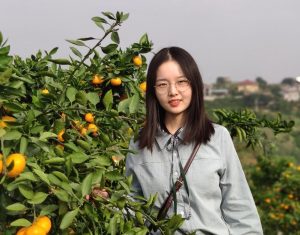Meng-Qi Feng: Plant Physiology First Author
 Meng-Qi Feng, first author of “miR171-targeted SCARECROW-LIKE genes CsSCL2 and CsSCL3 regulate somatic embryogenesis in citrus”
Meng-Qi Feng, first author of “miR171-targeted SCARECROW-LIKE genes CsSCL2 and CsSCL3 regulate somatic embryogenesis in citrus”
Current Position: Ph.D, National Key Laboratory for Germplasm Innovation & Utilization of Horticultural Crops, College of Horticulture and Forestry Sciences, Huazhong Agricultural University
Education:
2016.09-2022.12 Huazhong Agricultural University, Ph.D.
2012.09-2016.06 Shandong Agricultural University, Bachelor
Non-scientific interests: badminton, swimming
Brief bio:
I have been studying for my PhD in Prof. Wen-Wu Guo’s Cell Engineering and Breeding Lab and conducting research on citrus somatic embryogenesis (SE) mechanism under the supervision of Prof. Guo and Dr. Xiao-Meng Wu, aiming at improving the efficiency of germplasm innovation in vitro. We use citrus embryonic callus as the material to elucidate the function and regulatory pathways of miRNA-target genes in SE by genetic transformation and biochemical experiments. In the working models we propose, miR156a-CsSPL regulate the expression of downstream miR172d-CsTOE, thus to alter starch accumulation level in callus and regulate SE in citrus; the target genes of miR171c, CsSCL2/3, modulate ROS homeostasis through the interactive protein CsClot and directly suppress the expression of regeneration-related
genes, thus regulating SE in citrus. The results have been published in Journal of Experimental Botany (2022) and Plant Physiology (2023).
论文:The miR171-targeted CsSCLs regulate somatic embryogenesis by modulating ROS homeostasis and regeneration-related genes
姓名:冯梦琦
目前职位:求职中
教育经历:
2016.09-2022.12 华中农业大学,博士
2012.09-2016.06 山东农业大学,学士
兴趣爱好:羽毛球,游泳
个人简介:
本人于2016年有幸加入郭文武教授的柑橘细胞工程育种课题组,在郭老师和伍小萌博士的指导下进行柑橘体细胞胚发生机理研究,旨在提高离体种质创新效率。我们以柑橘胚性愈伤组织为材料,通过遗传转化和生化实验等多种手段,解析miRNA-靶基因调控体细胞胚发生的功能和作用通路。提出miR156a-CsSPL调控下游miR172d-CsTOE表达,进而影响细胞内淀粉积累,从而控制愈伤组织体细胞胚发生的工作模型;提出miR171c靶基因CsSCL2/3通过互作蛋白CsClot降低细胞内ROS含量或直接抑制下游再生相关基因表达,从而调控体细胞胚发生的作用机理,研究结果发表于Journal of Experimental Botany (2022),Plant Physiology (2023)。



